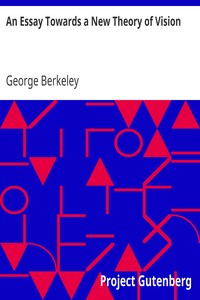| Author |
Berkeley, George, 1685-1753 |
| Title |
An Essay Towards a New Theory of Vision
|
| Note |
Reading ease score: 49.3 (College-level). Difficult to read.
|
| Credits |
Produced by Col Choat. HTML version by Al Haines.
|
| Summary |
"An Essay Towards a New Theory of Vision" by George Berkeley is a philosophical treatise written during the early 18th century. The work delves into the concepts of perception, specifically addressing how we perceive distance, magnitude, and the situation of objects through sight. Berkeley challenges existing theories on vision, particularly those that assert we perceive these aspects through mathematical angles and geometrical lines, instead proposing that our perceptions are rooted in experience and the ideas we associate with them. At the start of the essay, Berkeley outlines his intention to investigate how we perceive distance and magnitude, asserting that distance itself is not directly visible but rather inferred through experiential judgment. He discusses the relationship between our sensory perceptions—particularly how the sensations related to the positions of our eyes and the ensuing visual confusion contribute to our judgments on the size and distance of objects. By drawing on allegorical examples, such as the perspective of someone born blind, Berkeley illustrates that our understanding of objects' placement and identity is fundamentally experiential and not inherent in the act of seeing itself; rather, it is shaped by our interactions with tangible reality over time. (This is an automatically generated summary.)
|
| Language |
English |
| LoC Class |
B: Philosophy, Psychology, Religion
|
| Subject |
Vision -- Early works to 1800
|
| Category |
Text |
| EBook-No. |
4722 |
| Release Date |
Dec 1, 2003 |
| Most Recently Updated |
Dec 28, 2020 |
| Copyright Status |
Public domain in the USA. |
| Downloads |
101 downloads in the last 30 days. |
|
Project Gutenberg eBooks are always free!
|

